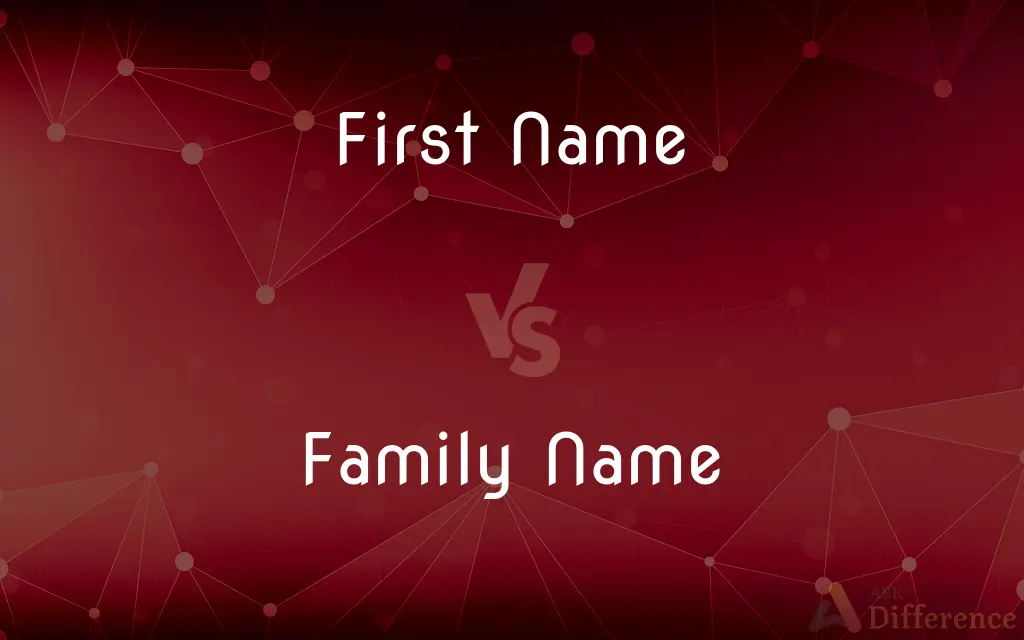First Name vs. Family Name — What's the Difference?
By Tayyaba Rehman & Fiza Rafique — Published on October 12, 2023
The first name, also known as a given name, is personally assigned, while the family name, or surname, is inherited and shared among family members. Both contribute to identifying an individual.

Difference Between First Name and Family Name
Table of Contents
ADVERTISEMENT
Key Differences
First name and family name serve to identify and refer to individuals but carry different weights in social contexts. The first name is the personal identifier given to a person, usually at birth or during a naming ceremony. It’s meant to specifically recognize an individual. On the contrary, the family name, inherited and typically passed down through generations, helps in identifying a person's familial lineage and is not unique to the individual.
One’s first name is commonly used in an informal and social context, providing a direct and personal way to address someone. The family name is conventionally employed in formal settings or whenever a respectful or official address is intended, creating a more formalized or distanced form of address and is usually affixed with titles like Mr., Mrs., or Dr.
In certain cultures and traditions, the first name is often chosen based on its meaning, the season of birth, or other personal reasons relevant to the individual or the parents. In contrast, the family name usually does not consider individual circumstances but rather adheres to the lineal heritage, linking individuals to their ancestors and extending family.
Cultural contexts play a pivotal role in the positioning of the first name and family name. In many Western cultures, the first name precedes the family name, whereas, in several Eastern cultures, the family name is placed before the first name, reflecting differing societal norms and values associated with individualism and collectivism.
Interestingly, first names can be changed relatively easily in most jurisdictions, permitting individuals to alter the name they are recognized by socially and legally. Family names, however, are typically more rigid and changing them often involves a more thorough legal process as they are deeply tied with familial and ancestral identity.
ADVERTISEMENT
Comparison Chart
Usage Context
Informal
Formal
Representation
Individual
Family/Lineage
Position (Western)
Precedes surname
Follows first name
Changeability
Easier to change
Harder to change
Cultural Importance
Varies
Ancestral
Compare with Definitions
First Name
An individual’s primary personal identifier.
Her first name is Jessica.
Family Name
Utilized for formal identification purposes.
Please enter your family name in the application form.
First Name
Used informally to address someone directly.
Please, call me by my first name, Dave.
Family Name
Altered often through marriage or legal change.
She adopted his family name after the wedding.
First Name
Assigned, often at birth, to distinguish a person.
His parents gave him the first name of Mark after his grandfather.
Family Name
A surname, inherited and shared with relatives.
The family name Smith is quite common in the United States.
First Name
Changeable through legal means.
She changed her first name to Lily.
Family Name
Represents familial and ancestral lineage.
Their family name has a rich historical background.
First Name
Precedes the surname in Western cultures.
My first name is Sara, and I am from Texas.
Family Name
Might precede the first name in certain cultures.
In my country, the family name is written first.
Common Curiosities
What is a family name?
A family name, or surname, is inherited and shared among family members.
Can a first name be changed?
Yes, first names can typically be changed through a legal process.
Is it common to be addressed by the family name in formal settings?
Yes, the family name is often used in formal and respectful addresses.
How does a first name differ from a family name?
A first name is a personal name, while a family name is shared within a family lineage.
How often do family names change within families?
Family names typically remain constant unless altered through marriage or legal change.
Can cultural beliefs influence the choice of a first name?
Absolutely, cultural beliefs often influence the selection of first names.
What is a first name?
A first name is a personal identifier given to an individual.
Is the first name used in formal contexts?
First names are commonly used in informal contexts.
Are first names unique?
First names are not unique and can be shared by multiple individuals.
What influences the choice of a family name?
Family names are typically inherited and not chosen.
Can first names have familial significance?
Yes, first names can be chosen to honor family members or ancestors.
Does the position of the first name and family name vary culturally?
Yes, some cultures place the family name before the first name and vice versa.
How is a family name passed down?
A family name is typically passed down from generation to generation.
Why might someone change their first name?
Reasons might include personal preference, religious beliefs, or numerology.
How are family names used in genealogical research?
Family names are vital in tracing ancestry and building family trees in genealogy.
Share Your Discovery

Previous Comparison
Ferrous Sulfate vs. Iron Glycinate
Next Comparison
Capital vs. DrawingsAuthor Spotlight
Written by
Tayyaba RehmanTayyaba Rehman is a distinguished writer, currently serving as a primary contributor to askdifference.com. As a researcher in semantics and etymology, Tayyaba's passion for the complexity of languages and their distinctions has found a perfect home on the platform. Tayyaba delves into the intricacies of language, distinguishing between commonly confused words and phrases, thereby providing clarity for readers worldwide.
Co-written by
Fiza RafiqueFiza Rafique is a skilled content writer at AskDifference.com, where she meticulously refines and enhances written pieces. Drawing from her vast editorial expertise, Fiza ensures clarity, accuracy, and precision in every article. Passionate about language, she continually seeks to elevate the quality of content for readers worldwide.














































